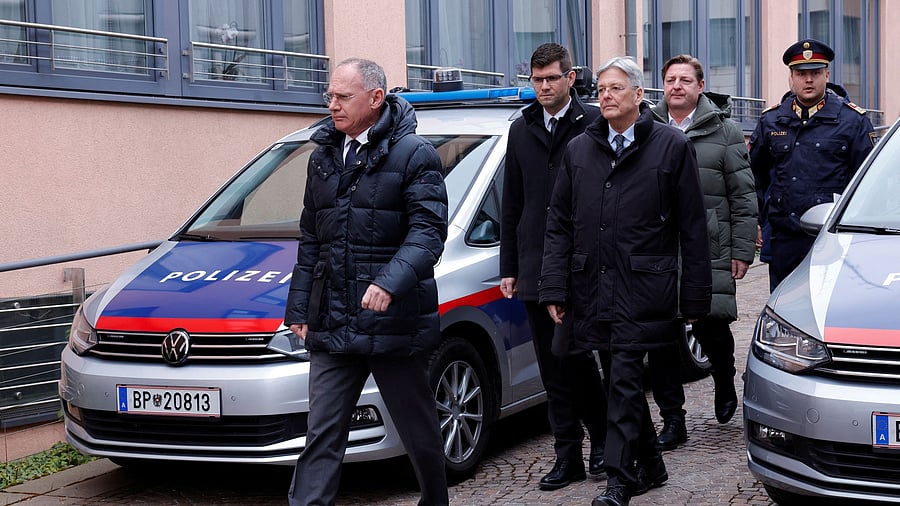
Austrian Interior Minister Gerhard Karner, Carinthia's Governor Peter Kaiser and Günther Albel, mayor of the town of Villach arrive at a press conference outside a police station in the town of Villach, after a 14-year-old boy was killed and several others were wounded in a stabbing attack, Austria
Credit: Reuters Photo
A Syrian asylum-seeker who Austrian authorities said killed a teenager and wounded five other people in a knife attack in Villach, Austria, was inspired by the Islamic State militant group, officials said Sunday.
The man, who was detained after the attack Saturday, had become radicalised online, said Austria's interior minister, Gerhard Karner. Police said they believed the victims were chosen at random.
The suspect, 23, came to Austria from Syria in 2020 and was later given asylum, according to the Interior Ministry.
The attack comes days after an Afghan citizen, who came to Germany as a child refugee, drove a car into a crowd of people at a union march in Munich, 150 miles from Villach, killing two people and wounding nearly 40.
In July, singer Taylor Swift was forced to cancel three concerts in Vienna, Austria's capital, after authorities learned of a plan to attack the venue by two teenagers who had become radicalized online. Neither was a refugee.
Austria's far-right Freedom Party has profited from fears of foreigners, especially young male asylum-seekers. Campaigning on a slogan of "Fortress Austria," the party came in first in elections last year, with 29 per cent of the vote. Last week it gave up its quest to form a governing coalition in Austria's current parliament, but its popularity continues to rise, according to polls.
The attack in Villach, a quaint city in the south near the Italian and Slovenian borders, happened around 4 pm Saturday on the city's old town square, where a man started stabbing random people with a folding knife, police in Villach said.
In the seven minutes between when police got the first call and the time the man was apprehended, he killed a 14-year-old and wounded five other people, police said.
The attack was eventually stopped by a 42-year-old Syrian citizen who saw the violence unfolding, according to authorities.
"A witness saw the event and decided to intervene -- he rammed the perpetrator with his car and thus probably prevented worse things from happening," said Michaela Kohlweiss, the state police director who is in charge of the investigation.
Two officers were able to restrain and then arrest the suspect immediately afterward.
On Thursday, police briefly believed that there was a second assailant involved and brought in extra forces, the Austrian equivalent of SWAT teams and two helicopters. But authorities now believe the suspect acted alone.
Police said Sunday that the suspect did not have a police record and had not been monitored by domestic intelligence.
When officers searched his apartment, however, they found clear evidence of "Islamist thought" and Islamic State flags hanging on the walls, they said, but no weapons or explosives.
Police said that they were still investigating the suspect's background and motivation, and that it appeared he had become radicalized online in a very short period.
Peter Kaiser, Carinthia's center-left governor, called for the "harshest consequences" for the attacker, saying on social media that the perpetrator "must be put on trial, imprisoned, and deported." Herbert Kickl, the firebrand leader of the Freedom Party, called the attack a "system failure of the first order."
The city's mayor, Günther Albel, wrote on social media: "To all those who sow hatred and violence, I say: You will not win."
Millions of Syrians sought refuge in Europe, including in Austria, after a popular uprising against the nation's autocratic longtime leader, Bashar Assad, that began in 2011 and turned into a civil war. The large number of arrivals has strained social safety nets in Europe and stirred concern about assimilation, which has at times taken an openly xenophobic form and provided an opening for right-wing, nationalist political movements.
The collapse of the Assad regime in December prompted several European countries to pause legal proceedings on asylum status for Syrians. Austria has said it plans to deport Syrians whose claims for asylum fail.
Violence is relatively uncommon in Austria, which was ranked as the fifth-safest country in the world as of 2023, according to the Global Peace Index.